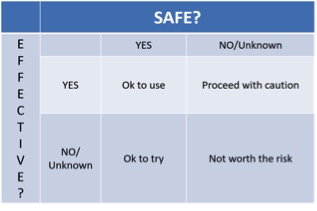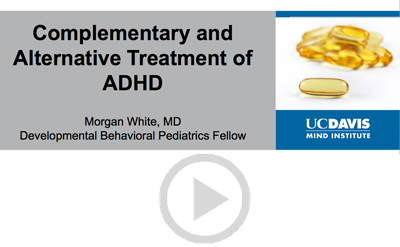Resources
Attention-Deficit/Hyperactivity Disorder
Complementary and Alternative Treatment of ADHD
Complementary and Alternative Medicine (CAM) describes many treatment types that are not considered part of Western medicine. CAM includes mind-body practices like meditation, body-based practices like massage, and natural products like nutritional supplements. Recently, computer training and app based programs have become proposed new treatments to target ADHD. CAM may be used along with (i.e., complementary), or instead of (i.e., alternative) Western medicine. Although some of these treatments may be beneficial, it is important to understand the risks and benefits of each treatment.
- Always discuss any CAM treatment with your doctor before you begin
- Consider whether the treatment is safe and whether it has been shown to be effective in improving symptoms

- Special care should be taken when considering CAM for children, pregnant women, nursing women, the elderly, and those with chronic medical conditions
- Prior to starting any therapy, determine which symptoms you hope to improve and keep track of these symptoms before and while using the therapy
- Remember that even natural substances can be dangerous
- Are you considering a Complementary Health Approach? by the National Center for Complementary and Integrative Health » - This website provides a great deal of information about making decisions on complementary and alternative therapies
- Melatonin is a hormone naturally made by the body to regulate sleep patterns
- Research shows that melatonin improves difficulty falling asleep and nighttime awakenings in a wide range of children, including those with ADHD, as well as adults
- Safety has been demonstrated for short term use, but no research has evaluated long term use
- Likely benefits for sleep problems, safe for short term use, but unknown safety for long term use
- Effect of melatonin on sleep, behavior, and cognition in ADHD and chronic sleep-onset insomnia » by Van der Heijden et al.
- Omega 3 fatty acids are found naturally in many foods, but tend to be lacking in Westernized diets
- Benefits, if present, take up to 3 months to show
- Likely safe, but unknown benefits and may be associated with upset stomach and bleeding problems
- Polyunsaturated fatty acids (PUFA) for attention deficit hyperactivity disorder (ADHD) in children and adolescents » - a Cochrane Database Review
- Elimination diets include elimination of a single food, elimination of multiple foods, or an extremely limited diet including only a few select foods
- Research results are mixed regarding the benefits of elimination diets in people with ADHD. Some studies show a small benefit, while others show no benefit.
- Early studies showed elimination of monosodium glutamate (MSG), artificial coloring, sweeteners, and preservatives may have some benefits, but the studies did not use ideal study methods
- Gluten-free diets have shown benefits for children with Celiac Disease and ADHD, but not in children without Celiac Disease
- Elimination diets may lead to a variety of vitamin/mineral deficiencies, so be sure to discuss with a doctor or dietician when considering elimination of specific foods
- ADHD and Diet: What you need to know by Understood.org »
- Involves the insertion of thin needles into the skin to improve body functioning and promote self-healing
- Originated in China over 2000 years ago
- Most commonly used for treating pain
- Small amounts of pressure or electrical stimulation may also have similar benefits
- Limited evidence exists showing the benefit or safety for acupuncture in treating ADHD
- Further studies are warranted to establish these facts
- Acupuncture for Attention Deficit Hyperactivity Disorder (ADHD) in children and adolescents » - a Cochrane Database Review
- Concentrates on controlled breathing, meditation and focusing on body postures
- Provides overall health benefits
- Widely used for relaxation and stress management
- Randomized trial in 2015 suggests that yoga helped improve ADHD symptoms as well as CBTg (Group Cognitive Behavioral Therapy) which is frequently utilized for ADHD treatment
- Person-centered Yoga Therapeutic Approach for Adult Attention Deficit-Hyperactivity Disorder by Salloum »
- Further research is needed to determine whether yoga is an effective treatment
- Yoga is safe, has minimal risks, and may have potential benefits for those with ADHD
- Utilize specialized computer games to target ADHD symptoms including inattention and distractibility
- Many also target the executive function deficits that are common in people with ADHD, including working memory (the part of memory that holds information temporarily so you can use it) and inhibition (the ability to resist acting impulsively)
- There are many new computer-based treatments being developed and tested for ADHD and executive function challenges
- Research regarding computer training methods show mixed results. Although some studies show benefits in specific areas, there is minimal evidence showing results will carry over into real life situations
- More research is needed to determine whether these programs will provide lasting benefits
- Here is an article describing several of the popular computer based training programs currently available. Keep in mind that there is mixed evidence about the benefits of these programs: 10 Best Brain Training Programs for Children with ADHD from ADDitude »
- Computer Brain Training for ADHD: a short YouTube video by Dr Julie Schweitzer »
- Complementary and Other Interventions from CHADD »
- National Center for Complementary and Integrative Health »
- Consumer Lab provides independent testing of health and nutrition products »
- National Institute of Health Office of Dietary Supplements »
- University of Michigan Complementary Medicine page »


